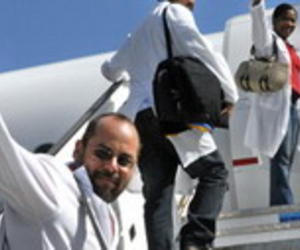The Flip Side of Cuba’s Missions Abroad
- Submitted by: lena campos
- Health and Medicine
- 01 / 29 / 2013

Leaving Cuba, by whatever means, has become the most cherished dream of many Cubans, just as many Americans dream of becoming millionaires.
Although our new immigration regulations seem to open a path to this utopia, international aid missions remain the easiest way to realize this.
International assistance provided by our professionals in various fields, especially in health care and education, has allowed us to become recognized worldwide as one of the governments that provides the most aid.
Thanks to our support, hundreds of thousands of poor people in the region have undergone surgery for free, both inside and outside Cuba. Likewise, incalculable numbers of Haitians were spared the consequences of the terrible earthquake and the no less horrifying outbreak of cholera that struck that unfortunate land.
In more than a dozen nations, our teachers have taught millions of people to read and write through the Cuban “Yo si Puedo” (Yes I can) method.
Our assistance personnel have provided not only professional aid but also spiritual support after embracing those cultures, often previously unknown to them, and becoming a part of them.
Among the benefits for Cuba have been certain bilateral agreements, especially oil in the case of Venezuela, which is no secret.
These contacts have also improved the standard of living of the families of Cuban internationalists, who’ve been able to bring home latest-generation household appliances, some have been able to purchase modern or old cars in good condition and of course hard currency, which is paid to each of them at the end of their mission. With these funds, more than a few of them have been able to buy homes or repair and modernize the ones they already own.
They’re able to buy or bring back computers for their children, which otherwise they could never dream of having here in Cuba, or a simple bike, which the low wages here can’t buy. These material things aren’t essential, but are still very important in the life of any human being.
International assistance provided by our professionals in various fields, especially in health care and education, has allowed us to become recognized worldwide as one of the governments that provides the most aid.
But the internationalist missions have a flip side that many forget when they leave Cuba.
On this side, what’s seldom spoken of is the separation of the family, especially parents from children. This is worse in the case of the doctors, who spent five or more years on missions in Africa and Venezuela.
How many children, barely a month after their births, are torn from their mother’s breast and left in the care of a grandmother, an aunt or some other relative?
How many are completely transformed during the difficult years of adolescence owing to the absence of their parents and not having anyone who understands them?
How many began using alcohol or stealing because they’re left alone when they’re still at the age where they need support and guidance?
This is why I don’t understand why Mirelis and Luis want to leave on another mission. They went on one five years ago and left their two children with the grandparents.
Upon their return, they brought back a bunch of things (that they still haven’t used), bought a house in the center of town, and — to top it off — they bought a car for the family.
As important as our partnerships with other countries are, and despite how much it does to improve our family budgets here, I can’t stop thinking about those who are left behind to suffer the separation from their loved ones.
It seems they still don’t have enough “stuff,” or maybe the commitment they feel for other peoples is greater than the commitment they have for their own children.
When the children were young, their grandparents took care of them the best they could. I was a witness to the many times the older couple had to deal with everything from accidents at home, diarrheal disease and shortness of breath (both of the kids have asthma).
Now the two children are nearly teenagers. One of them is twelve and the youngest is nine. But I wonder if it’s easier to deal with them now that they’re older and more independent or whether this makes the task more difficult.
As important as our partnerships with other countries are, and despite how much it does to improve our family budgets here, I can’t stop thinking about those who are left behind to suffer the separation from their loved ones.
I keep thinking about the setbacks and frustrations. The joys and triumphs that are only shared through an occasional email, a text message or a phone call, which are never as warm as a hug from mama or a scolding from daddy.
Hopefully, in time my neighbors will realize that their children need more from them. They require advice, conversation, affection, education and kisses more than modern gadgets or some other fad that’s impossible to acquire with our wages in Cuba.
Source: Havana Times.org
Comments